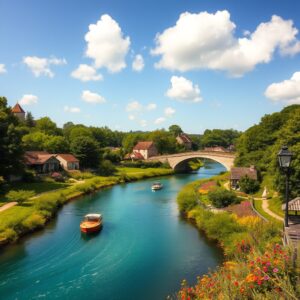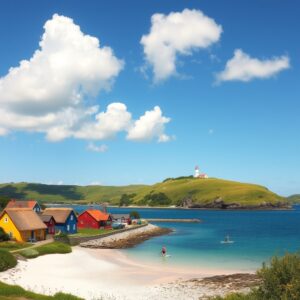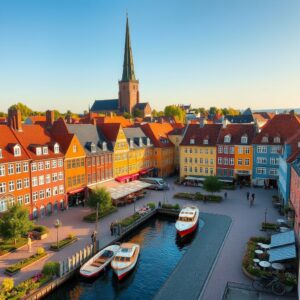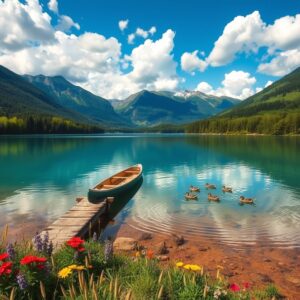
Explore & Play
Discover interesting topics and solve the accompanying crossword puzzle.
Island Crossword | Explore Fascinating Islands
Table of Contents
Welcome to our exploration of the world’s most fascinating islands! To start, we invite you to test your knowledge with our Island crossword puzzle. It’s a fun and interactive way to engage with the names and features of some of the most remarkable islands around the globe. Feel free to dive into the crossword first and see how many island names you can identify.
If you’re new to the topic or would like a deeper understanding of these incredible destinations, we recommend reading through our detailed article right after the crossword. This will provide you with valuable insights and enrich your knowledge, making the crossword even more enjoyable when you return to it. Whether you choose to tackle the puzzle first or explore the article first, we hope you find this journey through the world’s islands both informative and entertaining.
Island Crossword
You can either fill in the crossword puzzle directly on this page or click the button in the bottom right corner to print it for free.
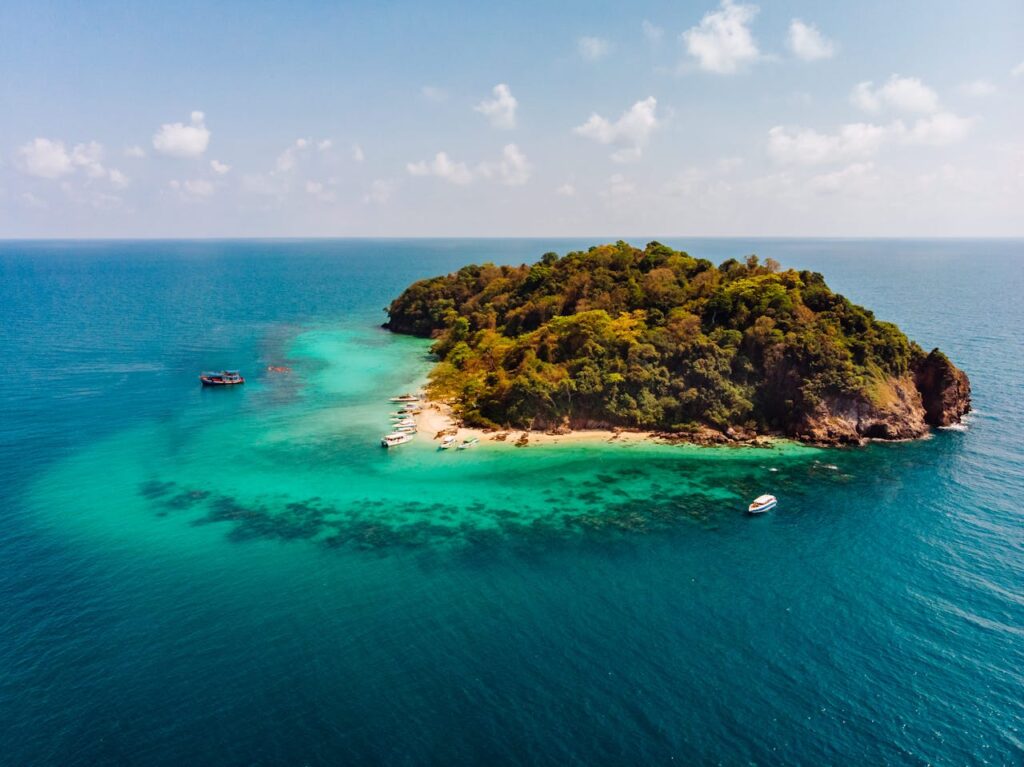
Exploring the World's Most Fascinating Islands
1. The Wonders of Archipelagos
Archipelagos, or groups of islands, are often hidden gems brimming with natural beauty and rich ecosystems. These clusters of islands offer a diverse array of landscapes and experiences.The Galápagos Archipelago
The Galápagos Archipelago is a prime example of an archipelago that has captured the world’s attention. Located in the Pacific Ocean, this Ecuadorian chain of islands is renowned for its unique biodiversity and conservation efforts. The islands are home to species like the giant tortoise and marine iguana, which have evolved in isolation, making them invaluable to scientists studying evolution and ecology.The Maldives
Situated in the South Pacific Ocean, the Maldives is celebrated for its stunning coral reefs and luxurious resorts. This island nation consists of over 1,000 coral islands, creating a paradise for divers and beach lovers alike. The Maldives’ vibrant marine life and crystal-clear waters make it a top destination for underwater exploration.The Azores
The Azores, an archipelago in the North Atlantic, features São Miguel as its largest island. Known for its volcanic landscapes, lush green valleys, and hot springs, the Azores offer a unique combination of natural beauty and outdoor adventure. The island’s geothermal activity contributes to its picturesque scenery, including the famous Sete Cidades crater lakes.2. The Largest Islands in the World
Some islands are so vast they rival continents in size and diversity. These large landmasses boast a range of climates and ecosystems.Greenland
Greenland, the world’s largest island, is located in the Arctic and is renowned for its icy landscapes and dramatic ice sheets. It plays a crucial role in global climate studies, with its melting ice contributing to rising sea levels. Despite its harsh climate, Greenland’s rugged beauty and unique Arctic wildlife, such as polar bears and seals, make it a fascinating destination.New Guinea
New Guinea, the second-largest island, lies to the north of Australia and is known for its rich biodiversity and cultural diversity. The island’s rainforests are home to exotic species like the bird of paradise and tree kangaroo. Additionally, New Guinea’s indigenous peoples possess a rich cultural heritage with over 800 languages spoken across the island.Borneo
Borneo, shared by Malaysia, Brunei, and Indonesia, is the third-largest island and features some of the world’s oldest rainforests. The island is renowned for its endangered species, including orangutans and pygmy elephants. Borneo’s rainforests and wetlands play a critical role in global biodiversity and conservation.3. Volcanic Islands and Their Dramatic Landscapes
Volcanic islands often captivate visitors with their dramatic landscapes and geothermal activity. These islands offer a glimpse into the powerful geological forces that shape our planet.Iceland
Iceland is a volcanic wonderland characterized by its geothermal features, including geysers, hot springs, and lava fields. Reykjavik, the capital, is known for its Blue Lagoon, a natural geothermal spa with mineral-rich waters. Iceland’s volcanoes, such as Eyjafjallajökull and Hekla, contribute to its striking and otherworldly landscape.Java
Java, an island in Indonesia, is renowned for its volcanic activity, with several active volcanoes, including Mount Merapi and Mount Bromo. The island’s volcanic soils support rich agricultural lands and contribute to its cultural heritage, with ancient temples such as Borobudur and Prambanan serving as testaments to Java’s historical significance.Komodo
Komodo Island, part of Indonesia’s Lesser Sunda Islands, is famous for its volcanic terrain and the Komodo dragon, the world’s largest lizard. The island’s rugged landscapes and diverse marine environments make it a popular destination for adventure seekers and nature enthusiasts. The Komodo National Park, encompassing the island, is a UNESCO World Heritage site known for its unique biodiversity.4. Tropical Paradises and Their Unique Features
Tropical islands are celebrated for their lush landscapes, vibrant marine life, and idyllic climates. These paradises offer a perfect escape for relaxation and exploration.Bali
Bali, an Indonesian island, is renowned for its stunning beaches, terraced rice paddies, and rich cultural heritage. Visitors flock to Bali to experience its vibrant arts scene, traditional dance performances, and lush landscapes. The island’s numerous temples, such as Uluwatu and Tanah Lot, add to its cultural allure.Fiji
Fiji, located in the South Pacific, is famous for its coral reefs and warm, turquoise waters. The island nation offers exceptional snorkeling and diving experiences, with vibrant coral gardens and diverse marine life. Fiji’s lush rainforests and welcoming culture make it a top destination for both relaxation and adventure.Mauritius
Mauritius, an island nation in the Indian Ocean, boasts stunning lagoons, white-sand beaches, and a rich cultural heritage. The island’s natural beauty includes the Black River Gorges National Park and the colorful underwater world of the Coral Reefs. Mauritius offers a blend of relaxation and exploration, with opportunities for hiking, water sports, and cultural experiences.5. Remote and Secluded Islands
Some islands are so remote they offer a tranquil escape from the hustle and bustle of modern life. These secluded spots provide a peaceful retreat and unique experiences.Saint Helena
Saint Helena, located in the South Atlantic Ocean, is renowned for its isolation and historical significance. The island is famously known as the place of Napoleon Bonaparte’s exile and offers a glimpse into its colonial past. The rugged landscapes and unique flora and fauna add to Saint Helena’s charm.Easter Island
Easter Island, or Rapa Nui, is a remote island famous for its Moai statues, monumental stone carvings that reflect the island’s rich cultural heritage. Located in the southeastern Pacific Ocean, Easter Island’s isolated location adds to the mystery and allure of its ancient statues and archaeological sites.Ascension Island
Ascension Island, located in the South Atlantic Ocean, plays a crucial role in global satellite tracking and offers a unique environment for nature enthusiasts. The island’s volcanic landscapes and unique flora, including the endemic Ascension Island tree fern, make it a fascinating destination for those interested in both science and nature.6. Islands with Rich Cultural Heritage
Many islands are not only geographical wonders but also cultural treasures with deep historical roots. These islands offer insights into diverse histories and traditions.Malta
Malta, a small island nation in the Mediterranean, is rich in historical sites and ancient architecture. The island’s cities, including Valletta and Mdina, are home to well-preserved medieval fortifications and historic buildings. Malta’s strategic location has made it a crossroads of various cultures throughout history.Corsica
Corsica, a French island in the Mediterranean, boasts a rugged landscape and a rich cultural heritage. Known for its diverse terrain, including mountains and coastal areas, Corsica offers visitors a blend of natural beauty and historical sites. The island’s unique culture and cuisine reflect its complex history of French and Italian influences.Sicily
Sicily, the largest island in the Mediterranean, is known for its ancient ruins and cultural heritage. The island’s historical sites include the Valley of the Temples and the Roman mosaics of Piazza Armerina. Sicily’s diverse history, influenced by Greek, Roman, Arab, and Norman cultures, is evident in its architecture and cuisine.7. Islands and Their Unique Ecosystems
Islands often host unique ecosystems that are shaped by their isolation and climate. These ecosystems support a variety of flora and fauna that may not be found elsewhere.Madagascar
Madagascar, an island nation off the southeastern coast of Africa, is renowned for its distinctive wildlife and ecosystems. The island’s isolation has led to the evolution of unique species, such as lemurs and fossa. Madagascar’s diverse habitats, including rainforests and spiny deserts, contribute to its status as a biodiversity hotspot.Palawan
Palawan, a Philippine island known for its natural beauty, features stunning landscapes and diverse ecosystems. The island’s beaches, limestone cliffs, and crystal-clear waters make it a popular destination for nature enthusiasts. Palawan’s protected areas, such as the Underground River and Tubbataha Reefs, showcase its rich biodiversity.Hokkaido
Hokkaido, the northernmost island of Japan, offers a unique blend of natural beauty and cultural experiences. The island is known for its hot springs, ski resorts, and national parks. Hokkaido’s diverse ecosystems, including temperate forests and volcanic landscapes, make it a popular destination for outdoor activities and exploration.8. Exploring Lesser-Known Islands
While popular islands attract millions of visitors, lesser-known islands also offer incredible experiences. These hidden gems provide unique opportunities for discovery and adventure.Bonaire
Bonaire, a Dutch Caribbean island known for its diving spots, is a hidden gem in the Caribbean. The island’s marine park, featuring vibrant coral reefs and diverse marine life, makes it a top destination for underwater enthusiasts. Bonaire’s commitment to marine conservation ensures its underwater beauty remains pristine.Seychelles
The Seychelles, an archipelago in the Indian Ocean, offers stunning beaches and conservation areas. The islands are known for their unique granite boulders and crystal-clear waters, making them a popular destination for eco-tourism and relaxation. Seychelles’ conservation efforts, including the protection of giant tortoises, highlight its commitment to preserving its natural heritage.Saipan
Saipan, the largest island in the Northern Mariana Islands, offers a mix of historical sites and natural attractions. The island’s history, including its role in World War II, is evident in its historical landmarks and museums. Saipan’s natural beauty, including stunning beaches and coral reefs, provides a well-rounded experience for visitors.9. Island Geography and Formation
Understanding how islands form and evolve provides insight into their ecological and geological significance. These processes shape the unique characteristics of each island.Formation of Atolls and Reefs
Atolls and coral reefs are formed through the accumulation of coral polyps and sediment over time. As coral reefs grow and expand, they create ring-shaped atolls with a lagoon in the center. These formations provide important habitats for marine life and contribute to the beauty of tropical islands.Volcanic Islands
Volcanic islands are created by volcanic activity, where magma rises from beneath the ocean floor and solidifies to form land. These islands often feature dramatic landscapes, including volcanic craters and lava flows. Volcanic islands play a crucial role in shaping Earth’s geological features and contribute to the diversity of island ecosystems.Tectonic Activity
Tectonic plates play a significant role in the formation of islands. When tectonic plates collide or move apart, they can create new landmasses or uplift existing ones. This geological activity contributes to the diversity of island formations and their unique features.10. The Allure of Island Life
Islands are a diverse and fascinating part of our world, each with its own unique story and charm. Whether you’re drawn to their natural beauty, cultural heritage, or remote tranquility, islands offer a wealth of experiences waiting to be explored. As you journey through these remarkable places, don’t forget to challenge yourself with the crossword puzzle, featuring names of some of these extraordinary islands.Share to...
I hope you enjoy the content.
Want to receive our daily crossword puzzle or article? Subscribe!
You may also be interested in
Share to…
Want to receive our daily crossword puzzle?
-
Jigsaw Puzzles
Chinese Zodiac Rabbit Jigsaw Puzzle – Ink Art Series 250 | 300 | 500 Pieces
kr 348,00 – kr 439,00Price range: kr 348,00 through kr 439,00 Select options This product has multiple variants. The options may be chosen on the product page -
Jigsaw Puzzles
Norwegian Stave Church Abstract Jigsaw Puzzle 250 | 300 | 500 Pieces
kr 348,00 – kr 439,00Price range: kr 348,00 through kr 439,00 Select options This product has multiple variants. The options may be chosen on the product page -
Jigsaw Puzzles
Chinese Dragon Jigsaw Puzzle – Zodiac Series Art 250 | 300 | 500 Pieces
kr 348,00 – kr 439,00Price range: kr 348,00 through kr 439,00 Select options This product has multiple variants. The options may be chosen on the product page
